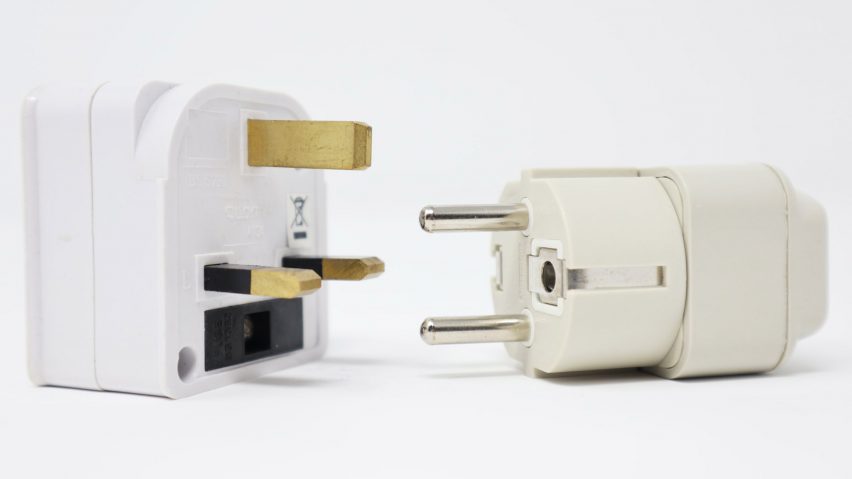Small design firms in the UK are moving their production abroad and setting up businesses in the European Union to get around a slump in business following Brexit.
Increases in costs and paperwork and falling orders from the EU are forcing designers to act.
Furniture designer Lara Bohinc has set up a business in the Netherlands due to the "untenable costs and hassle" of exporting to the continent.
"The UK is no longer a viable distribution hub," Bohinc told Dezeen.
Designer Peter Marigold is moving the production of his meltable bioplastic FORMcards to Germany, saying that keeping the small-scale business in the UK is "just not viable".
"Best to not have anything even touching the UK"
Furniture retailer Viaduct has acquired a Dutch business address to avoid having to move products to and from the UK.
"The best thing is to not have anything even touching the UK," said Viaduct founder James Mair.
Industrial designer Sebastian Bergne and textile designer Donna Wilson are among others who are looking for ways to set up overseas after seeing big falls in sales to the EU.
"Ultimately, having a European warehouse and distribution system would make a difference but we're not really big enough to do that," Wilson said.
"If you speak to any company, they're finding ways to remain in the EU"
Since the Brexit transition period ended on 31 December 2020, trade between Britain and the EU has plummeted, with exports from the UK down 41 per cent and imports down 29 per cent in January according to the Office for National Statistics.
It has had a big impact on design businesses, with Wilson reporting that her web sales in key European markets have dropped by around 25 per cent this year.
"There are all these service charges and much more paperwork," Wilson told Dezeen.
"So obviously if you were a company in Germany and you wanted to buy something that you could get in Europe, you would just stick to that instead of going to the UK."
Peter Marigold told Dezeen that many UK designers were facing the same problem.
"If you speak to any company, they're finding ways to remain in the EU and that's not going to happen by continuing to use UK businesses," said the London-based designer.
"It's just not viable. So they're all setting up EU businesses and EU VAT registrations."
Marigold is in discussions to hand over production and distribution of his FORMcards to a German partner.
"I've also started looking into tooling in Lithuania and Portugal," he added. "The prices are just so much cheaper and you've got access to that huge market."
Designers set up shop in the Netherlands
Lara Bohinc of London furniture brand Bohinc Studio decided to set up a company in the Netherlands after discovering that her e-commerce platform was blocking her from selling to the EU until she entered a VAT number for each European country.
"I got advice from accountants and they said to avoid the untenable costs and hassle of registering for VAT in multiple EU countries, the best solution was to set up a company somewhere in the EU," she told Dezeen.
According to Bohinc, registering a VAT number can cost up to £1,000 per country, potentially adding up to £27,000 to continue selling across all 27 member states.
"To set up a company in Holland, accounting and an office, I estimate the cost will be about three grand," she explained.
Furniture company Viaduct, which sources furniture from all over Europe and sees around 15 per cent of all its orders come from the continent, first arranged for a VAT number and warehousing in the Netherlands around a year ago.
Founder James Mair said this was crucial because the company regularly imported parts and exported finished products, which would have generated fees each time a shipment crosses the border.
"For a villa in the south of France we get furniture from ten different companies," Mair posited. "They all deliver into the UK, we put it all together and ship it out again."
According to Mair, importing all ten shipments would have totalled an extra £1,000 in customs clearance charges and exporting them in one consolidated shipment would have accrued another £100 fee.
Since then, Viaduct has also acquired a Dutch business address to avoid the additional fees and VAT registrations that are needed to move products between different EU countries as a British company.
Smaller companies could band together to share overheads
But designers such as Wilson and Bergne, who have smaller operations, fear that setting up in Europe requires a large upfront investment of time and money with no guaranteed returns.
"We're not massive so it seems like a lot of work," Wilson said.
"It's not really worth my while to set up a company in Europe," agreed Bergne. "It's like another business in itself."
One solution, which both are considering, is banding together with other companies to share the overheads and hassle associated with managing a European enterprise.
"There is a case for a staging post in Europe for smaller suppliers and designers," Bergne told Dezeen.
"It would probably need a dozen people to commit. Rather than complaining about things, it's about setting up other options to get around the problem."
Previously, designers told Dezeen that Brexit has resulted in an "admin nightmare" of extra paperwork and shipping delays, exacerbated by the lack of preparation and clear information available to couriers following the last-minute trade deal.
Although architects have dubbed the immediate impact of Brexit "quite minor", Rogers Stirk Harbour + Partners recently announced it was setting up a Paris office to win work in the EU over fears that clients would be hesitant to employ UK-based architects.

